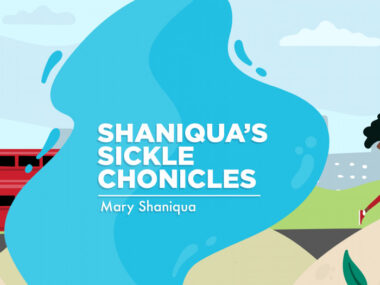Living with a disability doesn’t mean we are worth less
Overcoming harmful stigmas about people with conditions like sickle cell
Written by |

Although approximately 1 in 6 people worldwide are living with a significant disability, the narrative that those of us with disabilities deserve less continues to be perpetuated.
As a sickle cell disease patient, I know that stigma all too well. It suggests that I am worth less than my nondisabled counterparts, and that my diagnosis is the beginning and the end of my life’s purpose.
Though frustrating, and at times infuriating, I’ve learned over the years that other people’s preconceptions about me are their own problem. What’s important is how I see myself. I’ve realized that living with sickle cell disease benefits me, in terms of the person I am and how I view the world. It doesn’t limit my potential; instead, it allows me to challenge those whose misguided attitudes and beliefs hinder our society from being cohesive and civil. In essence, these people are disabling themselves and their communities — excuse the pun.
The value of a disabled life
Being disabled is part of my identity. It has made me far more resilient and inventive, helping me to circumvent and overcome barriers. Thinking back on my life, I’ve been most productive at times when I’ve been honest about my disability and its impact on me. It’s provided a perspective that nondisabled folks simply don’t have. This has been true in my career, personal life, and civic and volunteering duties.
I’ve always hated the term “sickle cell warrior,” because it feels extremely condescending. But I can concede that accepting my full self has served as a kind of superpower for me. The energy I once used to hide can now be poured into whatever task I’m focused on.
In a world that seeks to dim our light, I’d like to remind all disabled people that you are valuable, and you are enough. Your life is meaningful, and you can reach great heights despite the barriers before you. We are resilient and resourceful people who fight for the betterment of everybody, even though the masses may not see it.
As the World Health Organization notes, disability prevalence is increasing across the globe, meaning disability rights are becoming less of a minority issue. None of us — not even those who are healthy — know what’s around the corner. Anyone could become disabled at any time. Therefore, it’s the duty of all citizens to cultivate and maintain a society where everyone can function and thrive.
Disabled life is still life, and all lives are worth living.
Don’t allow anyone to convince you that you’re “less than.” We can all lead a purposeful and happy life filled with promise, hope, and potential.
For those who are able-bodied and support someone with a disability — whether as a caregiver, family member, or colleague — I challenge you to view them without limitations. See them first as a person and consider all they might achieve and experience if collectively we lifted the concrete ceiling our society has imposed.
Note: Sickle Cell Disease News is strictly a news and information website about the disease. It does not provide medical advice, diagnosis, or treatment. This content is not intended to be a substitute for professional medical advice, diagnosis, or treatment. Always seek the advice of your physician or other qualified health provider with any questions you may have regarding a medical condition. Never disregard professional medical advice or delay in seeking it because of something you have read on this website. The opinions expressed in this column are not those of Sickle Cell Disease News or its parent company, Bionews, and are intended to spark discussion about issues pertaining to sickle cell disease.







Leave a comment
Fill in the required fields to post. Your email address will not be published.